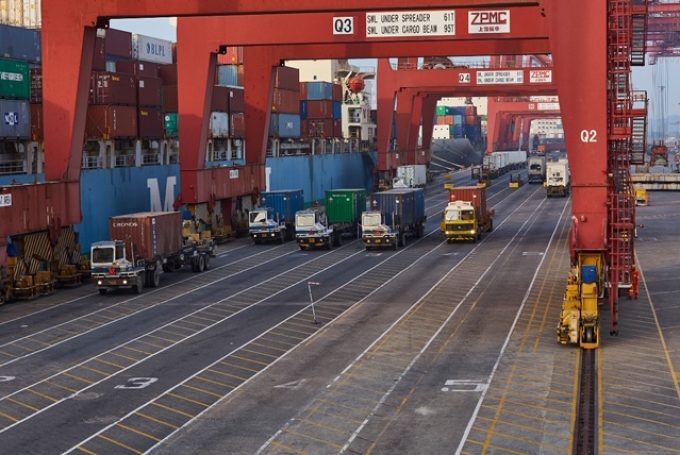Liner industry frustration as India demands millions in taxes
Foreign-flagged container shipping lines facing the heat from Indian tax authorities have been lobbying the ...
GM: RAISING THE ROOF GGM: IN FULL THROTTLE GZIM: MAERSK BOOST KNIN: READ-ACROSSMAERSK: NOT ENOUGHMAERSK: GUIDANCE UPGRADEZIM: ROLLERCOASTERCAT: HEAVY DUTYMAERSK: CATCHING UP PG: DESTOCKING PATTERNSPG: HEALTH CHECKWTC: THE FALLGXO: DEFENSIVE FWRD: RALLYING ON TAKEOVER TALKODFL: STEADY YIELDVW: NEW MODEL NEEDEDWTC: TAKING PROFIT
GM: RAISING THE ROOF GGM: IN FULL THROTTLE GZIM: MAERSK BOOST KNIN: READ-ACROSSMAERSK: NOT ENOUGHMAERSK: GUIDANCE UPGRADEZIM: ROLLERCOASTERCAT: HEAVY DUTYMAERSK: CATCHING UP PG: DESTOCKING PATTERNSPG: HEALTH CHECKWTC: THE FALLGXO: DEFENSIVE FWRD: RALLYING ON TAKEOVER TALKODFL: STEADY YIELDVW: NEW MODEL NEEDEDWTC: TAKING PROFIT

The scale of import cargo cleared through the Direct Port Delivery (DPD) system at major Indian ports is expanding.
DPD is a fast-track channel for customs-approved clients or importers – better known as accredited economic operators (AEOs).
They can collect cargo directly from the wharf within 48 hours of it landing, instead of shipping lines sending boxes to a container freight station for later delivery. It essentially marginalises or eliminates the role of supply chain intermediaries – effectively customs house agents.
At Jawaharlal Nehru Port Trust (Nhava Sheva) the share of DPD transactions reached 60% between April and January (the first 10 months of fiscal year 2021-22), up from 56% the previous year. By volume, DPD handling aggregated to 844,675 teu, out of 1.41m teu of imports this fiscal year, versus 776,980 teu and 1.37m teu, respectively, in 2020-21.
At Chennai, in the April-to-December period, PSA Chennai saw 36% of laden imports move via DPD, while the share at DP World Chennai stood at 43% and rising sequentially.
Similarly, the Direct Port Entry (DPE) model for factory-stuffed export cargo does not require shippers to route containers via a container freight station for customs verifications and secure “let export order” clearance before being gated-into the port terminal. JNPT’s April-January DPE handling hit 43.5% of such laden exports, according to port data.
The government rationale behind DPD and DPE is to lower logistics costs and create greater transparency in the supply chain ecosystem. To that end, the terminal handling charges and other ancillaries levied by container lines has been a controversial issue, prompting regulatory interventions in recent years.
To address such concerns, customs authorities in ports have opened a direct payment window for THC collections by terminal operators so that shippers or consignees, in theory, do not face any extra shore-side costs on top of ocean freight charges.
Amid recent Covid-induced capacity shortages, India’s Directorate General of Shipping in September called on carriers and other supply chain players, including freight forwarders, to stop collecting priority loading charges for cargo moved to/from inland container depots.
In response, the Container Shipping Lines Association (CSLA), however, argued there was full transparency carrier charges and that exporters always enjoyed an option to settle freight fees directly with rail companies.
“In fact, the shipping lines are the only ones whose charges are in the public domain and even put on their respective websites,” the CSLA said. “The priority charge too, if any, was, under exceptional circumstances, at the request of the exporter.”
Although the industry has a long way to go before some pricing bargains become available to shippers, trade enablers like DPD or DPE have a positive impact on port dwell time levels critical for smooth cargo flows.
Comment on this article